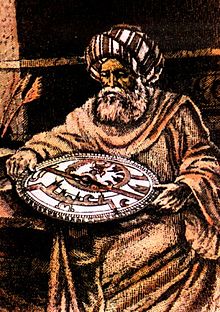al-Battani
Mohammed ibn Jābir al-Battānī (أبو عبد الله محمد بن جابر بن سنان الحراني الصابي البتاني Abu Abdullah Muhammad bin Jaber ibn Sinān al-Harrani as-Sabi Al-Battani , DMG Abu Abdullah Muhammad b Ǧābir ibn Sinān al-Harrani AS-SABI Al-Battani ) latinisiert Albategnius or Albatanius (* about 850-869 in Haran close Şanlıurfa - today Turkey ; † 929 on the journey from Baghdad to Raqqa in Qasr al-Jiss near Samarra ) was an Arab scholar and is considered one of the greatest astronomers in the Middle East.
Al-Battânî imparted the basics of Indian mathematics to the Arab world (textbook “Retha Ganita”: Indian numerals , the concept of zero , the basics of geometry and algebra ). Developed further by the Arabs, these foundations later reached Europe.
Al-Battânî's astronomical tables were first printed in Nuremberg in 1537 under the title Scientia Stellarum .
Al-Battânî was the governor of the caliphs in Syria . He made his astronomical observations partly in Damascus , partly in Aracta in Mesopotamia, which is why he is also called Mohammedes Aractensis. He calculated the length of the solar year to be 365 days 5 hours 46 minutes 24 seconds, i.e. accurate to within two minutes. Al-Battânî subjected the (apparent) eccentricity of the sun's orbit to a new, precise investigation and first noticed the movement of the apogee and calculated the movement of the planets very precisely. He also added new tables and many modifications to the conventional theory, the Ptolemaic system. Above all, however, Al-Battânî's contribution to trigonometry is significant , in which he was the first to use the sine instead of geometric chords . He was the first to find and prove the law of sines .
He also proved that the ratio of sine to cosine is equal to the tangent:
He also solved the equation sin x = a cos x :
The lunar crater Albategnius is named after him.
Web links
- The impact of Al-Battani on European Astronomy . (PDF; 164 kB) muslimheritage.com, accessed May 1, 2008
- John J. O'Connor, Edmund F. Robertson : Al-Battani. In: MacTutor History of Mathematics archive .
- al-Battānī in the Britannica Online Encyclopedia
- Al-Batani . In: Brockhaus Konversations-Lexikon 1894–1896, Volume 1, p. 323.
| personal data | |
|---|---|
| SURNAME | al-Battani |
| ALTERNATIVE NAMES | al-Battani, Mohammed ibn Jabir; Al-Battânî; Albatenius (Latinized); Albategnius (Latinized); Mohammed ibn Jābir al-Battānī; Mohammed ben Geber ben Senan Abu Abdallah al Batani; Abū ʿAbdullāh Muhammad ibn Jābir ibn Sinān al-Harrānī as-Sābī al-Battānī; Abū ʿAbdullāh Muḥammad ibn Ǧābir ibn Sinān al-Ḥarrānī aṣ-Ṣābī al-Battānī |
| BRIEF DESCRIPTION | arab scholar |
| DATE OF BIRTH | between 850 and 869 |
| PLACE OF BIRTH | Harran near Şanlıurfa (now Turkey ) |
| DATE OF DEATH | 929 |
| Place of death | Qasr al-Jiss (now Iraq ) |



